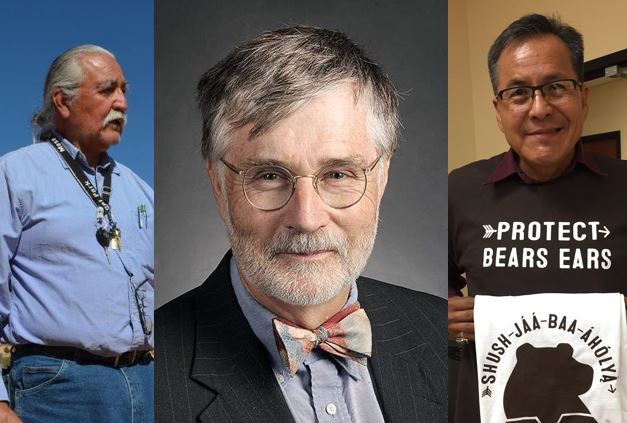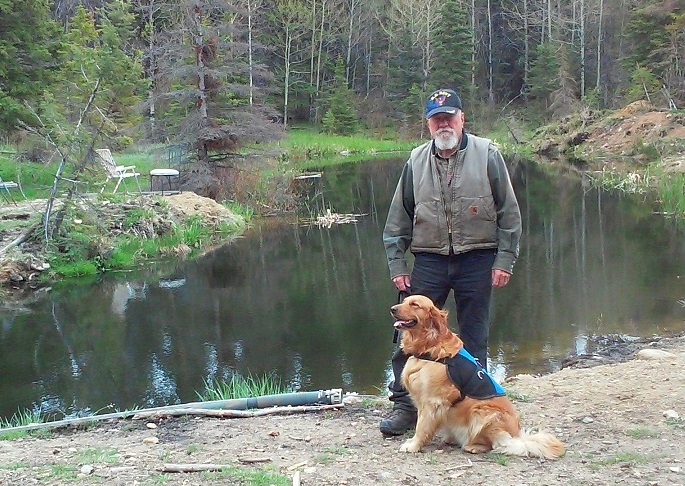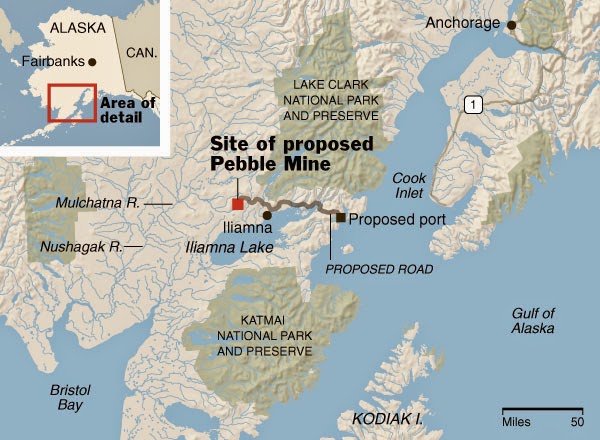If San Juan County successfully pursues the legal strategy outlined by Boos in letters to county officials – that no exceptions to client-attorney privilege exist under GRAMA – a possibly precedent-setting question follows: Does the open records law have any value if public “servants” can route all policy considerations through private attorneys then invoke attorney-client confidentiality to block scrutiny of how those policies became law?
OPINION
A rough transfer of power
By Bill Keshlear
Navajo Elder Willie Grayeyes projected a quiet sense of authority at an event to rekindle activist passion held late last year in Salt Lake City on the anniversary of President Trump’s proclamation that dramatically shrunk Bears Ears National Monument. Although Trump’s action was a setback, Grayeyes had just won a landmark election.
He and Kenneth Maryboy, advocates for Native American civil rights and sovereignty, in a couple of weeks would comprise the majority on the San Juan County Commission and stake claims to power.
There was talk of healing. Schwag was even engraved “Bears Ears is Healing.” An inspirational video showed members of several tribes, historical enemies, coming together for unity moments.
Yet behind the scenes, longtime private attorney of the commissioners-elect, Steven Boos, was offering advice the two might need if they met resistance. It included a discussion focused on a way to possibly unseat the publicly elected county attorney. A resolution introduced in April then later tabled authorized the county to do exactly that.
County governance ever since has been less kumbaya and more WWE smackdown – albeit ostensibly righteous smackdown to redress undisputed historical wrongs.
The new commissioners have chosen to govern through resolutions written by Boos and approved without informed consent of virtually anyone in the county. The count was up to 23 as of May 21.
The resolutions are mainly symbolic, and taken at face value there’s nothing particularly nefarious about a lawyer assuming the role of legislative aide. Mere mortals nowadays need people skilled in the Byzantine arts of government who, of their own free will, write mind-numbing statute.
The Durango, Colorado-based attorney nevertheless has morphed into what many in the county consider to be the personification of an “outsider” with designs on undemocratic change. He successfully assisted Maryboy and Grayeyes in several hot-button, politically charged cases, and his law firm played a prominent role in ongoing federal redistricting litigation that paved the way to shift the county’s balance of political power.
If even a smidgen of public-spirited comity existed before November’s election, it’s been replaced by a downward spiral of legal maneuvering, lack of trust and peevishness.
Monticello resident Kim Henderson grilled Maryboy at a recent commission meeting on whether any public forum had been held to discuss one of the resolutions introduced by him over the past few months. He said no. Input from county residents? No. County staff consulted? No.
Perhaps describing events in San Juan County as a grudge match is a bit melodramatic; it’s more like governance by good old fashion Bronx cheer.
An interim county administrator, David Everitt, was hired on May 7 in apparent violation of notification requirements of Utah’s Open and Public Meetings Act then re-hired after a procedural corrective two weeks later. District 1 Commissioner Bruce Adams was excluded from involvement in what could be considered, at best, a cursory job search and deliberations.
Everitt dropped in suddenly while still running Moab and even worked for a liberal mayor of Salt Lake City. The whole thing went over like a lead balloon.
Also on May 21, the new commissioners stymied a possible referendum on Bears Ears. It could’ve finally provided a more-or-less definitive answer to the $64,000 question: How much support actually exists in San Juan County for the monument?
Cultural and political rifts in San Juan County have gotten wider and deeper since Maryboy and Grayeyes took over. Stonewalling has produced at least a dozen requests for records under the Government Records Access and Management Act. One of those requests made it through the appeal pipeline and will be heard before the State Records Committee on June 13.
The request generally seeks insight into governing priorities of Maryboy and Grayeyes. Were the policies of the pro-Bears Ears commissioners preordained to align – in varying degrees – with the goals of a grand alliance that gave them a national platform for activism? Were the needs of a desperately poor county put on the back burner as a result?
If San Juan County successfully pursues the legal strategy outlined by Boos in letters to county officials – that no exceptions to client-attorney privilege exist under GRAMA – a possibly precedent-setting question follows: Does the open records law have any value if public “servants” can route all policy considerations through private attorneys then invoke attorney-client confidentiality to block scrutiny of how those policies became law?
(Keshlear is gathering information for a book proposal on environmental politics and communication strategies behind creation of Bears Ears National Monument. His request for public records will be heard before the State Records Committee in Salt Lake City on June 13.)
Originally posted by San Juan Record
Free Range Report
Thank you for reading our latest report, but before you go…
Our loyalty is to the truth and to YOU, our readers!
We respect your reading experience, and have refrained from putting up a paywall and obnoxious advertisements, which means that we get by on small donations from people like you. We’re not asking for much, but any amount that you can give goes a long way to securing a better future for the people who make America great.
[paypal_donation_button]
For as little as $1 you can support Free Range Report, and it takes only a moment.



